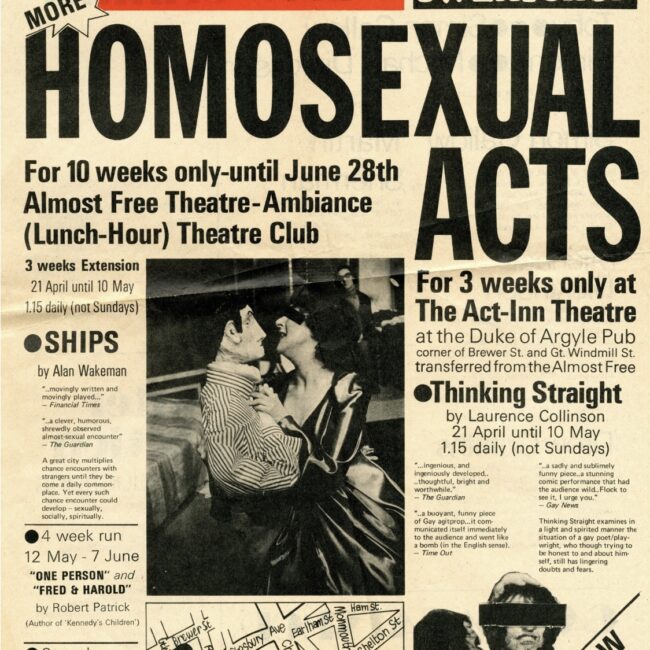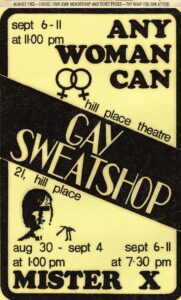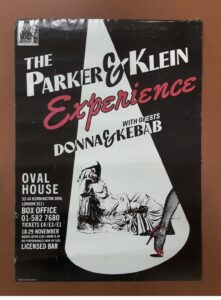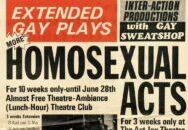
Radical Rediscovery: Homosexual Acts & Beyond, now there’s an intriguing event name! And it sounds great too. Marking the 50th anniversary of 1975’s Homosexual Acts, the first official Gay theatre season in Britain which took place at London’s Almost-Free Theatre, this is a new exhibition is set to interrogate and celebrate Lesbian and Gay theatre’s early years. The show comprises an array of posters, flyers, photos, magazines, props, set models, costumes, books, original footage and interviews with key participants.

Taking place at the London Performance Studios, the exhibition will explore the growth of the movement both in London and elsewhere, from highlighting the Gay Liberation Front activists who created street theatre to Gay Sweatshop touring plays that changed the lives of audiences in isolated communities. The exhibition also celebrates the radical drag of Bloolips and the lesbian camp of Hard Corps and Parker & Klein and the advent of Black Lesbian, Gay and Queer work in the late 1980s.
Radical Rediscovery: Homosexual Acts & Beyond takes a deep dive into work that grew from these early beginnings, the arguments and influences, the companies and characters as well as the struggle against censorship with the passing of Clause 28 and the impact of HIV AIDS on and in the theatre.
Curated by Associate Artist Dr Susan Croft, whose ongoing archive project Unfinished Histories is dedicated to preserving and celebrating the history of alternative theatre in Britain from the 1960s to the early 90s.
Dr Susan Croft says: “50 years ago Ed Berman, founder of influential arts project Inter-Action agreed to host Britain’s first Gay theatre season at the Almost Free Theatre in Soho. The press came in droves because as Alan Wakeman, one of the producers and a founder of Gay Sweatshop said: ‘We were saying, ‘Yeah, we’re gay – so what? and having the audacity to put on plays

about what life is like for gay people’. Runs were extended, moving to the Duke of Argyll pub and then the ICA and that first season was all plays by men but in 1976, Gay Sweatshop staged Jill Posener’s Any Woman Can, and toured this nationally. Julie Parker, who acted in it says: ‘People would come up …and talk to you afterwards… in tears… and say, ‘That’s me, that’s my story, that’s my life,’ and ‘I’ve never met people like you before.’ Julie went on to run The Drill Hall, a key London home for Lesbian and Gay performance.
This exhibition celebrates that early history along with lesser-known stories such as that of Bradford-based company The General Will who in 1975, controversially re-formed from an agit-prop group to a primarily working class lesbian and gay theatre company, making work with a wide range of community groups. Meanwhile In South London, the inhabitants of gay squats in Railton Road, Brixton were setting up their own activist theatre group the Brixton Faeries, Bloolips were performing in Notting Hill and numerous other lesbian and gay theatre groups such as Hormone Imbalance, Character Ladies, and Consenting Adults in Public were forming .
Through this exhibition, a linked symposium and a series of readings, ranging from Maureen Duffy’s Rites (1969) a version of the Bacchae, set in a women’s toilet to the first play by British black gay writer Martin Patrick, at Oval House in 1987, Radical Rediscovery: Homosexual Acts & Beyond will look in detail at this marginalised history and its impact on LGBTQ+ theatre today. Through a series of microgrants to young artists, we are also commissioning a series of new works-in-progress inspired by these earlier histories.”
Here are links to a few specific events happening during the exhibition.
7 and 8 Nov
Dragging Up and Acting Out: a Symposium-London Performance Studios
13 Nov
Where To Now?-London Performance Studios
| Queerguru’s Contributing Editor Ris Fatah is a successful fashion/luxury business consultant (when he can be bothered) who divides and wastes his time between London and Ibiza. He is a lover of all things queer, feminist, and human rights in general. @ris.fatah |

